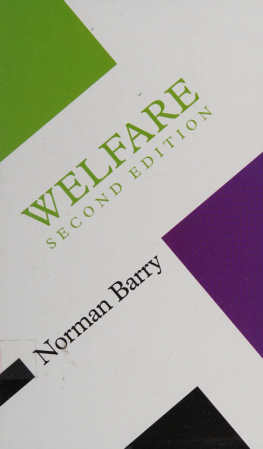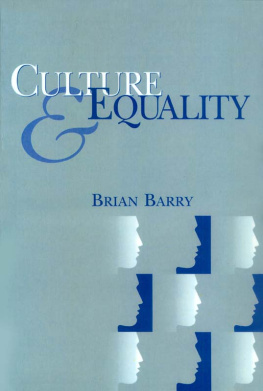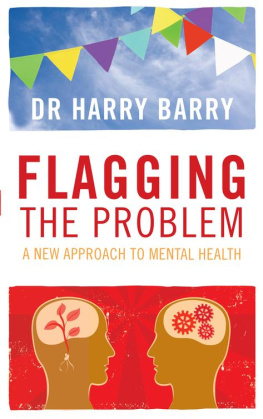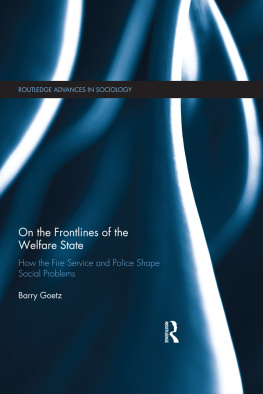Barry - Welfare
Here you can read online Barry - Welfare full text of the book (entire story) in english for free. Download pdf and epub, get meaning, cover and reviews about this ebook. City: Minneapolis, year: 1999, publisher: Univ. of Minnesota Press, genre: Politics. Description of the work, (preface) as well as reviews are available. Best literature library LitArk.com created for fans of good reading and offers a wide selection of genres:
Romance novel
Science fiction
Adventure
Detective
Science
History
Home and family
Prose
Art
Politics
Computer
Non-fiction
Religion
Business
Children
Humor
Choose a favorite category and find really read worthwhile books. Enjoy immersion in the world of imagination, feel the emotions of the characters or learn something new for yourself, make an fascinating discovery.
Welfare: summary, description and annotation
We offer to read an annotation, description, summary or preface (depends on what the author of the book "Welfare" wrote himself). If you haven't found the necessary information about the book — write in the comments, we will try to find it.
Barry: author's other books
Who wrote Welfare? Find out the surname, the name of the author of the book and a list of all author's works by series.
Welfare — read online for free the complete book (whole text) full work
Below is the text of the book, divided by pages. System saving the place of the last page read, allows you to conveniently read the book "Welfare" online for free, without having to search again every time where you left off. Put a bookmark, and you can go to the page where you finished reading at any time.
Font size:
Interval:
Bookmark:

Barry, Norman P
This book was produced in EPUB format by the Internet Archive.
The book pages were scanned and converted to EPUB format automatically. This process relies on optical character recognition, and is somewhat susceptible to errors. The book may not offer the correct reading sequence, and there may be weird characters, non-words, and incorrect guesses at structure. Some page numbers and headers or footers may remain from the scanned page. The process which identifies images might have found stray marks on the page which are not actually images from the book. The hidden page numbering which may be available to your ereader corresponds to the numbered pages in the print edition, but is not an exact match; page numbers will increment at the same rate as the corresponding print edition, but we may have started numbering before the print book's visible page numbers. The Internet Archive is working to improve the scanning process and resulting books, but in the meantime, we hope that this book will be useful to you.
The Internet Archive was founded in 1996 to build an Internet library and to promote universal access to all knowledge. The Archive's purposes include offering permanent access for researchers, historians, scholars, people with disabilities, and the general public to historical collections that exist in digital format. The Internet Archive includes texts, audio, moving images, and software as well as archived web pages, and provides specialized services for information access for the blind and other persons with disabilities.
Created with abbyy2epub (v.1.7.6)


$V
$
o
*
ROM
PORDHAM
LIBRARIES
i- ; - ?.. i
- , ry
-^0. a *
Library
tarrytown
NEW YORK

TARRYTQWN
NFW YORK
.
Second Edition
Concepts in Social Thought
Published Titles
Democracy, Second Edition Citizenship
Welfare, Second Edition Freedom
Bureaucracy, Second Edition Nationalism Trotskyism Revolution and Counter-Revolution Policy Socialism Exchange Social Science Power Rights Science
Liberalism, Second Edition The State Kinship Sovereignty Utopianism Postmodernity Ideology, Second Edition Pluralism Fascism Property Capitalism Class
Ecologism
Status
Anthony Arblaster J. M. Barbalet Norman P. Barry Zygmunt Bauman
David Beetham Craig Calhoun Alex Callinicos
Peter Calvert H. K. Colebatch Bernard Crick John Davis Gerard Delanty Keith Dowding Michael Freeden Steve Fuller
John Gray
John A. Hall and G. John Ikenberry
C. C. Harris
John Hoffman
Krishan Kumar
David Lyon
David McLellan Gregor McLennan Mark Neocleous Alan Ryan Peter Saunders Richard Scase Mark J. Smith Bryan S. Turner
Concepts in Social Thought
Second Edition
M
IN
NE
SO
TA
University of Minnesota Press
Minneapolis
Copyright 1999 Norman P. Barry
All rights reserved. No part of this publication may be reproduced, stored in a retrieval system, or transmitted, in any form or by any means, electronic, mechanical, photocopying, recording, or otherwise, without the prior written permission of the publisher.
First published by Open University Press 1999
Published simultaneously in the United States 1999 by the University of Minnesota Press
111 Third Avenue South, Suite 290, Minneapolis, MN 55401-2520 http://www.upress.umn.edu
Printed in Great Britain
Library of Congress Cataloging-in-Publication Data
Barry, Norman P.
Welfare/Norman Barry.
p. cm. (Concepts in social thought)
Includes bibliographical references and index.
ISBN 0-8166-3224-3 (hardcover : alk. paper). ISBN 0-8166-3225-1 (pbk.: alk. paper)
1. Public welfare. 2. Welfare state. I. Title. II. Series.
HV51.B37 1998 361dc21
98-17007
CIP
ISBN 0-8166-3224-3 (he) ISBN 0-8166-3225-1 (pb)
The University of Minnesota is an equal-opportunity educator and employer.
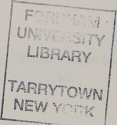
j
Preface to the First Edition vii
Preface to the Second Edition xi
1 The Idea of Welfare in Political Thought 1
2 Utilitarianism and the Origins of Welfare Philosophy 15
3 Anti-individualism: From the Minimal State to the
Welfare State 30
4 Liberal Political Economy and Welfare 43
5 The Critique of Individualism and the Ethics
of Welfare 61
6 Justice, Equality and Welfare 78
7 Welfare, the Welfare State and Politics 92
8 Welfare: A Postscript 121
Notes 139
Select Bibliography 147
Index 152
' |

Contemporary social and political thought is dominated by the concept of welfare in a way that would have surprised commentators in the last century. It is not that discourse about it was absent then. This is far from being the case since the ideas used in current political argument about welfare were first formulated at least two hundred years ago. The real difference is the central importance that is now attached to them. The injunction for the state to maximize a rather vague and diffuse thing called welfare, well-being or satisfaction now appears to override all other political values, whereas at one time this was understood to be a subordinate item on the agenda of government. Even some antistatist writers regard well-being in some sense or other as the sole desideratum of existence, even though they argue that it is achieved through individual experiences rather than from direct political action. It is this that makes it a peculiarly modern concept.
In this short book I have tried to outline the central features of the concept and to explicate its role in typical political arguments. Inevitably, this enterprise involves a discussion of welfare in the context of other political concepts, such as justice, equality, freedom and rights. One of the major problems is extracting it from these notions so as to isolate its distinctive characteristics. However, this is an extraordinarily difficult task because any review of welfare is certain to be overladen with highly contentious suppositions about the substantive ends of political life: the role of the state and the significance that is to be attached to individual self-fulfilment being the key areas of dispute.
Welfare
viii
I have tried to show that one of the most decisive elements in contemporary thought is the assimilation of the idea of welfare to the state. Put simply, this means that in political argument, outside more abstract political philosophy, welfare is inextricably tied up with the policies and institutions of the contemporary welfare state. However, this association is qeither analytically compelling nor an accurate historical picture. Economists and social philosophers have indicated that there is a variety of sources of well-being and only in the mid-twentieth century did it become part of an intellectual consensus that political authorities should be primarily responsible for their provision. Indeed, that consensus was shortlived and in contemporary political thought we are witnessing a strident rejection by important writers of the aforementioned assimilation.
Next pageFont size:
Interval:
Bookmark:
Similar books «Welfare»
Look at similar books to Welfare. We have selected literature similar in name and meaning in the hope of providing readers with more options to find new, interesting, not yet read works.
Discussion, reviews of the book Welfare and just readers' own opinions. Leave your comments, write what you think about the work, its meaning or the main characters. Specify what exactly you liked and what you didn't like, and why you think so.

